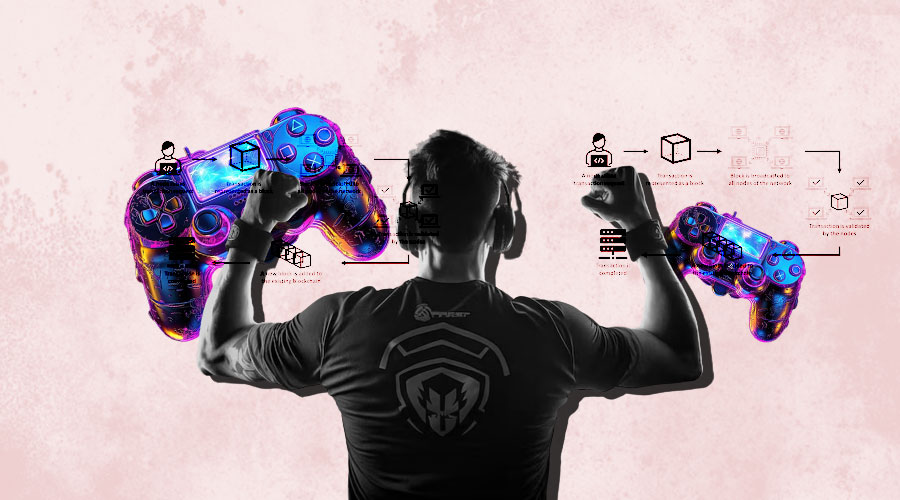 Unveiling gaming on blockchain and the future of esports
Unveiling gaming on blockchain and the future of esports
Video games that leverage blockchain technology to give players special features like real ownership of in-game items, provably fair gameplay, and decentralized markets are called “blockchain gaming.” Since they are kept on the server owned by the game creator, in-game currency and objects are not truly owned by players in conventional video games. The use of tokens on a blockchain to represent goods and money in blockchain games enables users to own and manage their digital assets.
Additionally, blockchain technology makes provably fair gaming possible, allowing users to confirm the objectivity and transparency of the game’s algorithms. Blockchain gaming may also have decentralized markets where users may transact directly with one another to purchase and sell in-game goods without the aid of mediators or centralized game creators.
Blockchain gaming differs from conventional video games in several ways:
- Players’ in-game cash and equipment are theirs to keep and manage in blockchain games. This implies that users may buy, sell, or utilize their assets inside the game ecosystem and in other games.
- Games built on blockchain technology are intended to run on decentralized networks, which means a single authority or institution does not govern them. This improves security, lowers the possibility of hackers, and increases the games’ resistance to censorship.
- Provably fair gameplay is made possible by blockchain technology, allowing users to confirm that the game’s algorithms are impartial and open.
- In exchange for carrying out particular in-game tasks or goals, players in many blockchain games are given money or tokens. Due to this, gamers may get paid for the time and effort they put into the game.
- Players’ feeling of community is strengthened through blockchain gaming. Without the aid of mediators or centralized game creators, gamers may trade in-game goods directly with one another via decentralized markets.
The gaming business might be significantly impacted by blockchain gaming in several ways. Blockchain gaming can give publishers and game creators new sources of income. Adopting blockchain technology can enable creators to commercialize their games in novel and inventive ways, including in-game sales of tokens and objects based on the blockchain.
Blockchain gaming can increase player engagement by granting real ownership of in-game assets and promoting community-driven gameplay. Players’ ability to buy and sell possessions makes the game’s economy lively. Blockchain technology can improve security and lower the chance of attacks in the gaming industry. Blockchain-based games are decentralized, and using smart contracts to enforce rules transparently and automatedly can assist.
Gaming on the blockchain might lead to the development of brand-new game genres and gameplay experiences that are not now conceivable. Blockchain-based games, for instance, allow players to design their game components or even whole games, bringing up a universe of creative possibilities. By giving players a simple and clear way to utilize and earn digital assets, blockchain gaming can promote the uptake of cryptocurrencies. Broader acceptance of cryptocurrencies in other sectors of the economy may occur as more people become accustomed to utilizing them in games.
Blockchain gaming relies heavily on cryptocurrency since it represents in-game products, money, and other assets. These resources are shown as tokens on a blockchain in blockchain games, enabling players to own and manage them. Blockchain gaming uses cryptocurrencies in a variety of ways.
The main in-game money in many blockchain games is Bitcoin. Since they may trade, sell, or use the cryptocurrency outside of the gaming ecosystem, this enables players to get paid for the time they spend playing the game. In blockchain games, virtual commodities like armor, weaponry, and other stuff are represented by Bitcoin. Thanks to this, players may now genuinely own their stuff and exchange or sell them with other players. In exchange for carrying out particular in-game tasks or goals, participants in some blockchain games are given bitcoin or tokens. This motivates participants to participate in the game and may encourage more people to use cryptocurrencies.
Blockchain gaming enables decentralized markets where users can exchange cryptocurrencies directly for in-game goods. As a result, there is no longer a need for middlemen or centralized game development, which strengthens the sense of community inside the game. In blockchain gaming, smart contracts—self-executing agreements that automatically enforce the game’s rules—are executed using cryptocurrency. Traditional video games cannot offer the same degree of confidence and security that smart contracts do, which includes ensuring that the game is fair and transparent.




